Unit 1 I go to school at 8 00 Lesson 3-Lesson 4 课件(共45张PPT)
文档属性
| 名称 | Unit 1 I go to school at 8 00 Lesson 3-Lesson 4 课件(共45张PPT) |
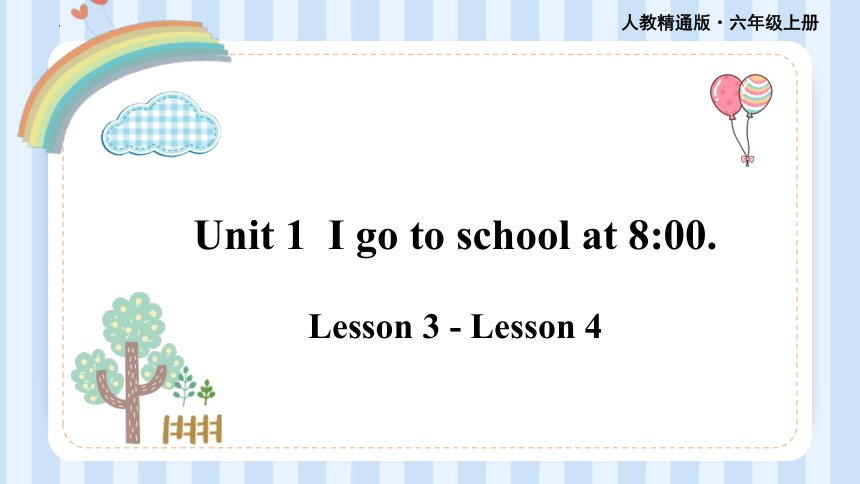
|
|
| 格式 | pptx | ||
| 文件大小 | 9.7MB | ||
| 资源类型 | 试卷 | ||
| 版本资源 | 人教精通版(三年级起点) | ||
| 科目 | 英语 | ||
| 更新时间 | 2023-08-16 11:26:43 | ||
图片预览

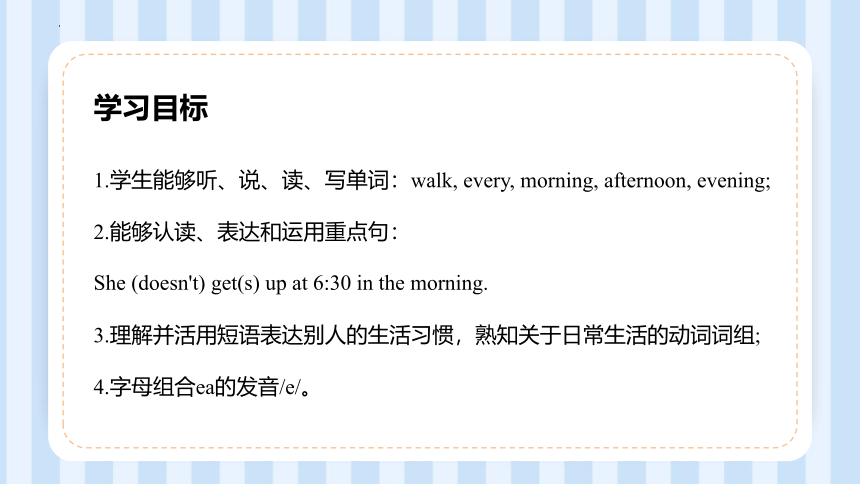

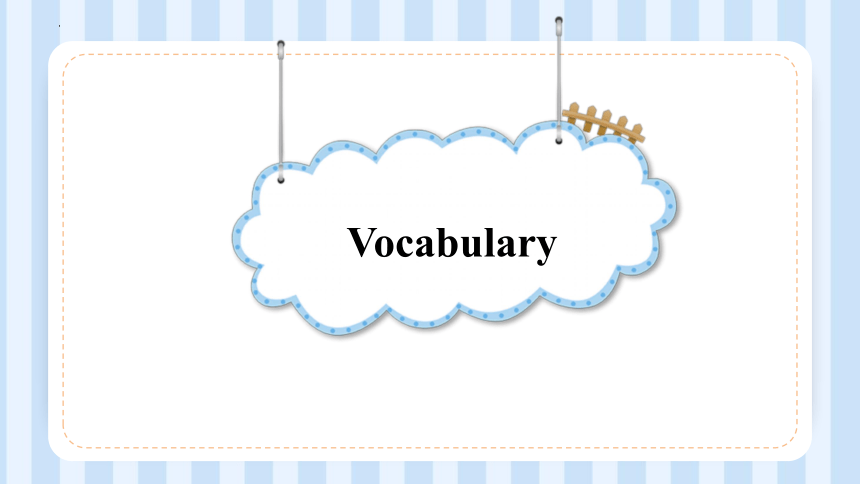
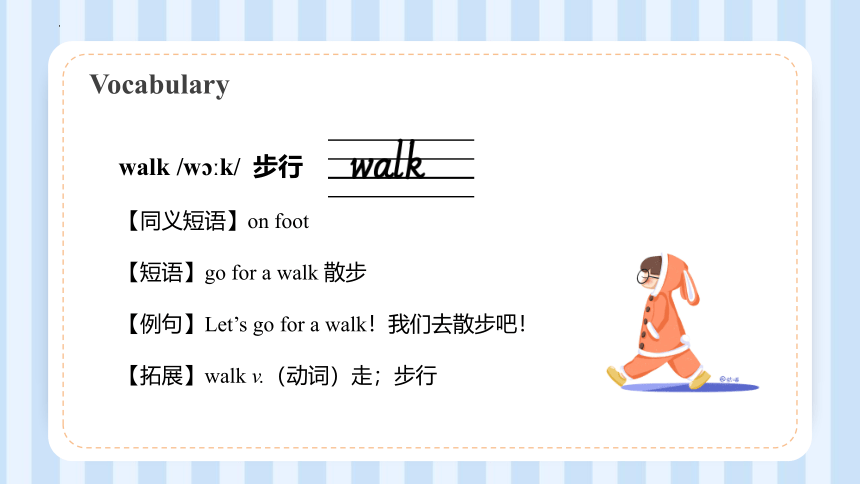
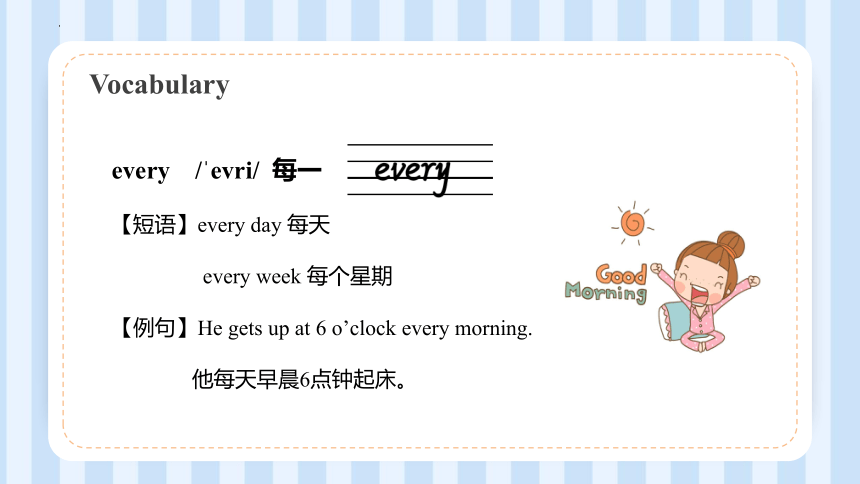
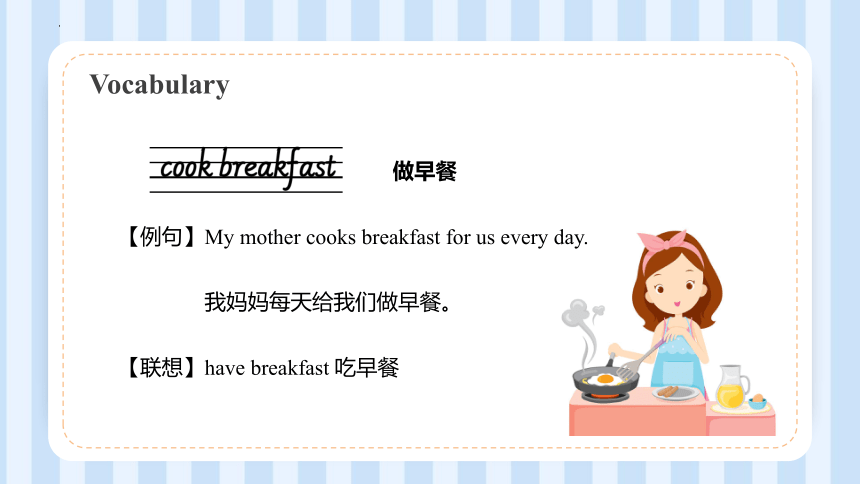
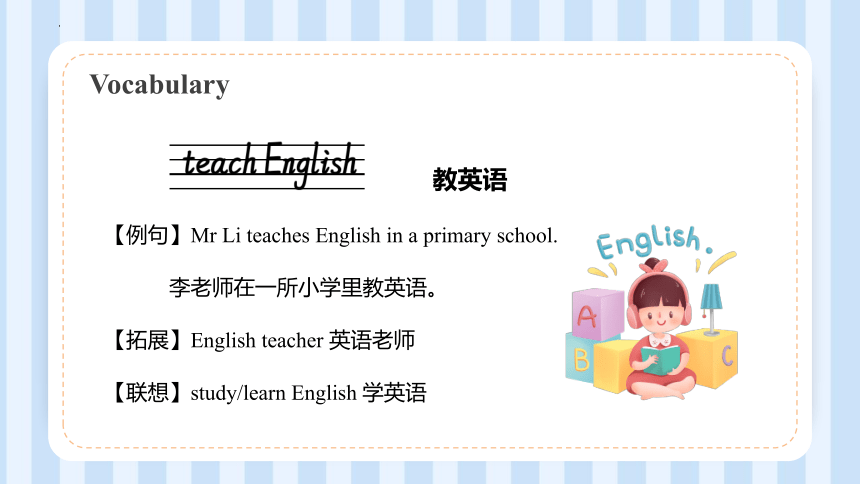
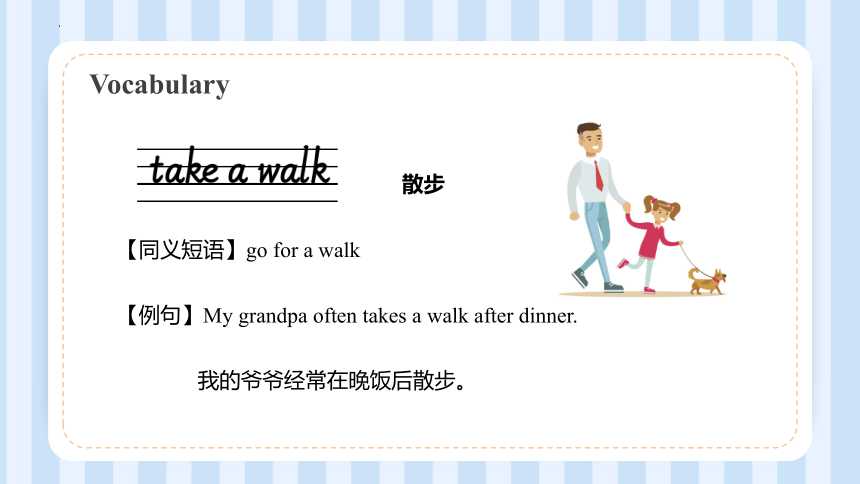
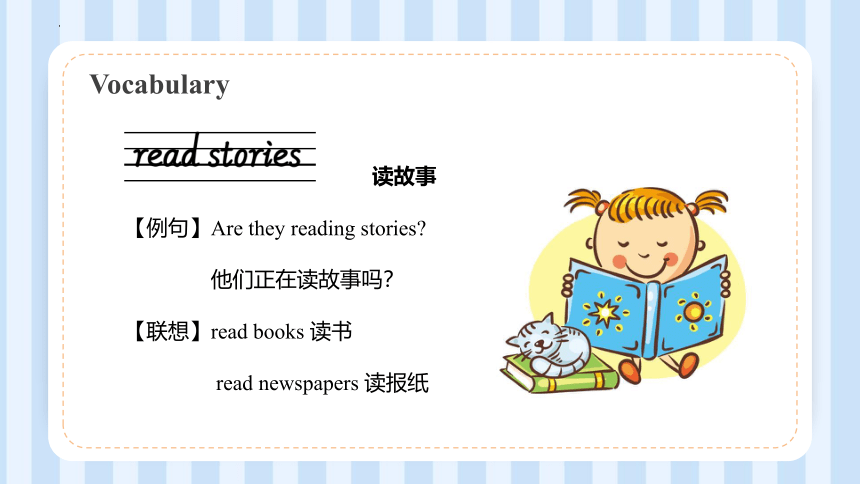
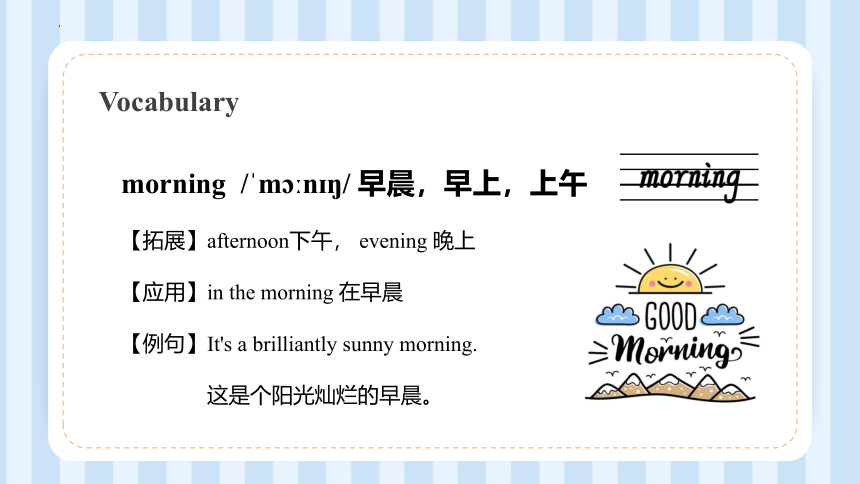
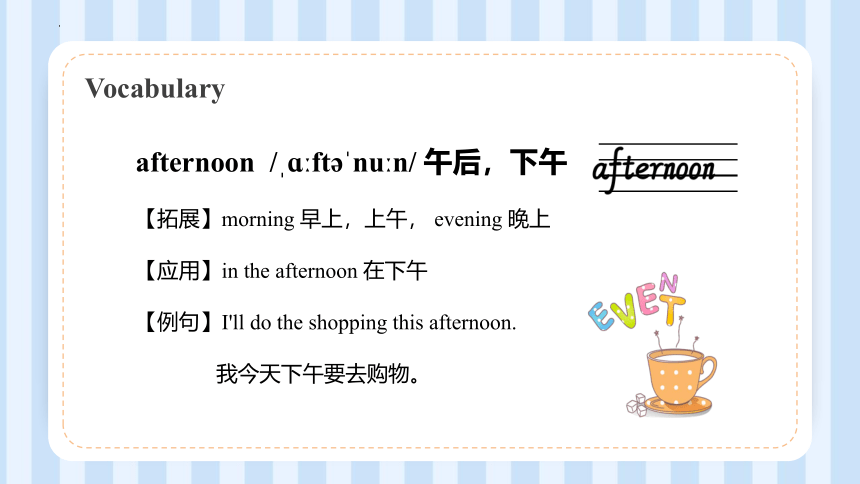
文档简介
(共45张PPT)
人教精通版·六年级上册
Unit 1 I go to school at 8:00.
Lesson 3 - Lesson 4
学习目标
1.学生能够听、说、读、写单词:walk, every, morning, afternoon, evening;
2.能够认读、表达和运用重点句:
She (doesn't) get(s) up at 6:30 in the morning.
3.理解并活用短语表达别人的生活习惯,熟知关于日常生活的动词词组;
4.字母组合ea的发音/e/。
Catalogue
1. Vocabulary
2. Text
3. Sentences
4 .Practice
Vocabulary
Vocabulary
walk /w k/ 步行
【同义短语】on foot
【短语】go for a walk 散步
【例句】Let’s go for a walk!我们去散步吧!
【拓展】walk v.(动词)走;步行
Vocabulary
every / evri/ 每一
【短语】every day 每天
every week 每个星期
【例句】He gets up at 6 o’clock every morning.
他每天早晨6点钟起床。
Vocabulary
做早餐
【例句】My mother cooks breakfast for us every day.
我妈妈每天给我们做早餐。
【联想】have breakfast 吃早餐
Vocabulary
教英语
【例句】Mr Li teaches English in a primary school.
李老师在一所小学里教英语。
【拓展】English teacher 英语老师
【联想】study/learn English 学英语
Vocabulary
散步
【同义短语】go for a walk
【例句】My grandpa often takes a walk after dinner.
我的爷爷经常在晚饭后散步。
Vocabulary
读故事
【例句】Are they reading stories
他们正在读故事吗?
【联想】read books 读书
read newspapers 读报纸
Vocabulary
morning / m n / 早晨,早上,上午
【拓展】afternoon下午, evening 晚上
【应用】in the morning 在早晨
【例句】It's a brilliantly sunny morning.
这是个阳光灿烂的早晨。
Vocabulary
afternoon / ɑ ft nu n/ 午后,下午
【拓展】morning 早上,上午, evening 晚上
【应用】in the afternoon 在下午
【例句】I'll do the shopping this afternoon.
我今天下午要去购物。
Vocabulary
evening / i vn / 晚上,傍晚
【拓展】morning 早上,上午,afternoon 午后,下午
in the evening 在晚上
【例句】The party is on Friday evening.
聚会定于周五晚上举行。
cook breakfast
teach English
take a walk
read stories
做早餐
教英语
散步
读故事
walk
every
morning
afternoon
evening
步行
每个
早晨
下午
晚上
Text
Lesson 3
Just read and talk
Dear Lucy,
I'm very happy to get your email. I'm from Beijing, China. I'm in Grade Six. My mother is an English teacher. Every morning, she gets up at 6:00. Then she cooks breakfast. She goes to school at 7:00. She has four lessons a day. Her students often learn English by singing, chanting and playing games. They like her lessons very much. She goes home at about 5:30 in the afternoon, and then she cooks dinner. After dinner she often takes a walk with my father She reads English stories to me. I love my mother and father very much! Please tell me about your parents, Lucy.
Best wishes,
Li Yan
From: Liyan@.cn
Send to: Lucy@
Subject: Thanks for your email!
Lesson 4
She gets up at 6:00 in the morning.
She doesn't get up at 6:30 in the morning.
Just practice
Let’s write
Let’s talk
Bring a few photos of your family or your friends.
Talk about them in groups.
Let’s chant
ea
Ted has a headache.
What's for his breakfast
Some bread is for Ted.
He wants a cake instead.
Sentences
She gets up at 6:00 in the morning.
She doesn't get up at 6:30 in the morning.
Sentences
一般现在时表达经常性动作和行为
Sentences
1.every week(day, year, month ...)系;
2.once/twice ... a week(day, year, month...)系;
3.often, usually, always, sometimes, never, seldom频率系;
4.on+某天;
5.其他不根据时间改变而改变的习惯规律和自然真理。
Sentences
He never drinks wine. 他从来不喝酒。
I seldom stay up late. 我很少熬夜。
Sometimes she drinks coffee in the afternoon.
有时她在下午喝咖啡。
He often goes to the cinema.他经常去那家电影院。
I usually drink a cup of water in the morning.
我通常早上喝一杯水。
We always go for a picnic on weekends.
我们周末总是去野餐。
Sentences
一般现在时用法
1.经常性或习惯性的动作,常与表示频度的时间状语连用
e.g. I go to school at 7 every morning.我每天早上7点去上学。
2.客观真理, 客观存在, 科学事实
e.g. The earth moves around the sun.地球绕着太阳转。
Sentences
3.用在格言或警句中
e.g. Pride goes before a fall.骄者必败。
4.现在时刻的状态、能力、性格、个性
e.g. Xiao Wang writes good English but does not speak well.
小王的英语书面表达能力好,但口语不好。
一般现在时的句型
1.肯定句:主语+动词原形/第三人称单数动词+其他.
2.否定句:主语+ don't/doesn't +动词原形+其他.
3.一般疑问句:Do/Does+主语+动词原形+其他
肯定回答: Yes,主语+ do/does.
否定回答: No,主语+don't/doesn't.
I teach English.
Miss White teaches English.
I don't teach English.
She doesn't teach English.
Do you/Does Miss White teach English
一般现在时的句型
1.肯定句:主语+ be动词+其他. I am a student.
2.否定句:主语+ be动词+ not+其他. I am not a student.
3.一般疑问句:be动词+主语+其他 -Are you ready -Yes, I am. / No, I'm not.
回答: Yes,主语+ be动词.
No,主语+ be动词+ not.
一般现在时的句型
人称 第一人称 第二人称 第三人称 数 单数 复数 单数 复数 单数 复数 单数 复数
主格 I we you you he she it they
宾格 me us you you him her it them
中文 我 我们 你 你们 他 她 它 他/她/它们
主语为单数第三人称的一般现在时
第三人称单数是语言中对话双方外其它某一个人。(简称三单)
I do my homework every day.
He does his homework every day.
tips:主语为第三人称单数时,谓语动词要用三单。
三单变化
Practice
用适当的介词和副词填空
1. Don't read _______ bed.
2._________ evening, the man goes to bed late.
3. It's very kind ______ you to say so.
4. Let's go out ______ play football.
5. They often go to school _______ their bikes.
6. The boy ______ blue goes shoppinghis mother.
根据图片,填空
1.My mother _______ _________ for me every morning.
2.Lucy often _______ __________ at 6:30 in the morning.
3.My sister _______ ________ at 6:00 in the afternoon.
4.My family usually ________ __________at 7:00 pm.
选出每组单词中画线部分发音不同的一项。
( )1.A.bread B.head C.eat
( )2.A.tea B.sweater C.read
( )3.A.weather B.peach C.speak
( )4.A.headache B.teacher C.breakfast
( )1.My mother is ______ English teacher and my father is _______ Chinese teacher.
A.an; a B. a; a C. an; an
( )2. My grandma often _______ to me.
A. read story B. reads story C. reads stories
( )3. Please tell me _______ your parents.
A. to B. about C. in
给下列问句选择合适的答语。
A. In school.
B. She goes to bed at 9: 00 pm.
C. At 6: 00 am.
D. She cooks breakfast at 6: 30 am.
E. No, he doesn't.
( )1. When do you get up
( )2. Do you have lunch at home or in school
( )3. When does Lucy go to bed
( )4. Does Tom watch TV in the evening
( )5. What time does your mother cook breakfast
选择合适的短语,并用其正确形式填空。
cook breakfast teach English
read stories take a walk
1.Li yan's mother usually ______ after dinner.
2.My brother likes reading. He often __________.
3.Miss Wang doesn't ________. She is a Chinese teacher.
4.I can't cook.So I don't ________ in the morning.
THANK YOU
人教精通版·六年级上册
Unit 1 I go to school at 8:00.
Lesson 3 - Lesson 4
学习目标
1.学生能够听、说、读、写单词:walk, every, morning, afternoon, evening;
2.能够认读、表达和运用重点句:
She (doesn't) get(s) up at 6:30 in the morning.
3.理解并活用短语表达别人的生活习惯,熟知关于日常生活的动词词组;
4.字母组合ea的发音/e/。
Catalogue
1. Vocabulary
2. Text
3. Sentences
4 .Practice
Vocabulary
Vocabulary
walk /w k/ 步行
【同义短语】on foot
【短语】go for a walk 散步
【例句】Let’s go for a walk!我们去散步吧!
【拓展】walk v.(动词)走;步行
Vocabulary
every / evri/ 每一
【短语】every day 每天
every week 每个星期
【例句】He gets up at 6 o’clock every morning.
他每天早晨6点钟起床。
Vocabulary
做早餐
【例句】My mother cooks breakfast for us every day.
我妈妈每天给我们做早餐。
【联想】have breakfast 吃早餐
Vocabulary
教英语
【例句】Mr Li teaches English in a primary school.
李老师在一所小学里教英语。
【拓展】English teacher 英语老师
【联想】study/learn English 学英语
Vocabulary
散步
【同义短语】go for a walk
【例句】My grandpa often takes a walk after dinner.
我的爷爷经常在晚饭后散步。
Vocabulary
读故事
【例句】Are they reading stories
他们正在读故事吗?
【联想】read books 读书
read newspapers 读报纸
Vocabulary
morning / m n / 早晨,早上,上午
【拓展】afternoon下午, evening 晚上
【应用】in the morning 在早晨
【例句】It's a brilliantly sunny morning.
这是个阳光灿烂的早晨。
Vocabulary
afternoon / ɑ ft nu n/ 午后,下午
【拓展】morning 早上,上午, evening 晚上
【应用】in the afternoon 在下午
【例句】I'll do the shopping this afternoon.
我今天下午要去购物。
Vocabulary
evening / i vn / 晚上,傍晚
【拓展】morning 早上,上午,afternoon 午后,下午
in the evening 在晚上
【例句】The party is on Friday evening.
聚会定于周五晚上举行。
cook breakfast
teach English
take a walk
read stories
做早餐
教英语
散步
读故事
walk
every
morning
afternoon
evening
步行
每个
早晨
下午
晚上
Text
Lesson 3
Just read and talk
Dear Lucy,
I'm very happy to get your email. I'm from Beijing, China. I'm in Grade Six. My mother is an English teacher. Every morning, she gets up at 6:00. Then she cooks breakfast. She goes to school at 7:00. She has four lessons a day. Her students often learn English by singing, chanting and playing games. They like her lessons very much. She goes home at about 5:30 in the afternoon, and then she cooks dinner. After dinner she often takes a walk with my father She reads English stories to me. I love my mother and father very much! Please tell me about your parents, Lucy.
Best wishes,
Li Yan
From: Liyan@.cn
Send to: Lucy@
Subject: Thanks for your email!
Lesson 4
She gets up at 6:00 in the morning.
She doesn't get up at 6:30 in the morning.
Just practice
Let’s write
Let’s talk
Bring a few photos of your family or your friends.
Talk about them in groups.
Let’s chant
ea
Ted has a headache.
What's for his breakfast
Some bread is for Ted.
He wants a cake instead.
Sentences
She gets up at 6:00 in the morning.
She doesn't get up at 6:30 in the morning.
Sentences
一般现在时表达经常性动作和行为
Sentences
1.every week(day, year, month ...)系;
2.once/twice ... a week(day, year, month...)系;
3.often, usually, always, sometimes, never, seldom频率系;
4.on+某天;
5.其他不根据时间改变而改变的习惯规律和自然真理。
Sentences
He never drinks wine. 他从来不喝酒。
I seldom stay up late. 我很少熬夜。
Sometimes she drinks coffee in the afternoon.
有时她在下午喝咖啡。
He often goes to the cinema.他经常去那家电影院。
I usually drink a cup of water in the morning.
我通常早上喝一杯水。
We always go for a picnic on weekends.
我们周末总是去野餐。
Sentences
一般现在时用法
1.经常性或习惯性的动作,常与表示频度的时间状语连用
e.g. I go to school at 7 every morning.我每天早上7点去上学。
2.客观真理, 客观存在, 科学事实
e.g. The earth moves around the sun.地球绕着太阳转。
Sentences
3.用在格言或警句中
e.g. Pride goes before a fall.骄者必败。
4.现在时刻的状态、能力、性格、个性
e.g. Xiao Wang writes good English but does not speak well.
小王的英语书面表达能力好,但口语不好。
一般现在时的句型
1.肯定句:主语+动词原形/第三人称单数动词+其他.
2.否定句:主语+ don't/doesn't +动词原形+其他.
3.一般疑问句:Do/Does+主语+动词原形+其他
肯定回答: Yes,主语+ do/does.
否定回答: No,主语+don't/doesn't.
I teach English.
Miss White teaches English.
I don't teach English.
She doesn't teach English.
Do you/Does Miss White teach English
一般现在时的句型
1.肯定句:主语+ be动词+其他. I am a student.
2.否定句:主语+ be动词+ not+其他. I am not a student.
3.一般疑问句:be动词+主语+其他 -Are you ready -Yes, I am. / No, I'm not.
回答: Yes,主语+ be动词.
No,主语+ be动词+ not.
一般现在时的句型
人称 第一人称 第二人称 第三人称 数 单数 复数 单数 复数 单数 复数 单数 复数
主格 I we you you he she it they
宾格 me us you you him her it them
中文 我 我们 你 你们 他 她 它 他/她/它们
主语为单数第三人称的一般现在时
第三人称单数是语言中对话双方外其它某一个人。(简称三单)
I do my homework every day.
He does his homework every day.
tips:主语为第三人称单数时,谓语动词要用三单。
三单变化
Practice
用适当的介词和副词填空
1. Don't read _______ bed.
2._________ evening, the man goes to bed late.
3. It's very kind ______ you to say so.
4. Let's go out ______ play football.
5. They often go to school _______ their bikes.
6. The boy ______ blue goes shoppinghis mother.
根据图片,填空
1.My mother _______ _________ for me every morning.
2.Lucy often _______ __________ at 6:30 in the morning.
3.My sister _______ ________ at 6:00 in the afternoon.
4.My family usually ________ __________at 7:00 pm.
选出每组单词中画线部分发音不同的一项。
( )1.A.bread B.head C.eat
( )2.A.tea B.sweater C.read
( )3.A.weather B.peach C.speak
( )4.A.headache B.teacher C.breakfast
( )1.My mother is ______ English teacher and my father is _______ Chinese teacher.
A.an; a B. a; a C. an; an
( )2. My grandma often _______ to me.
A. read story B. reads story C. reads stories
( )3. Please tell me _______ your parents.
A. to B. about C. in
给下列问句选择合适的答语。
A. In school.
B. She goes to bed at 9: 00 pm.
C. At 6: 00 am.
D. She cooks breakfast at 6: 30 am.
E. No, he doesn't.
( )1. When do you get up
( )2. Do you have lunch at home or in school
( )3. When does Lucy go to bed
( )4. Does Tom watch TV in the evening
( )5. What time does your mother cook breakfast
选择合适的短语,并用其正确形式填空。
cook breakfast teach English
read stories take a walk
1.Li yan's mother usually ______ after dinner.
2.My brother likes reading. He often __________.
3.Miss Wang doesn't ________. She is a Chinese teacher.
4.I can't cook.So I don't ________ in the morning.
THANK YOU
同课章节目录
- Unit 1 I go to school at 8:00.
- Lesson 1
- Lesson 2
- Lesson 3
- Lesson 4
- Lesson 5
- Lesson 6
- Unit 2 What's your hobby?
- Lesson 7
- Lesson 8
- Lesson 9
- Lesson 10
- Lesson 11
- Lesson 12
- Unit 3 Would you like to come to my birthday party
- Lesson 13
- Lesson 14
- Lesson 15
- Lesson 16
- Lesson 17
- Lesson 18
- Fun Time 1
- Recycle 1
- Recycle 2
- Fun Reading
- Unit 4 January is the first month.
- Lesson 19
- Lesson 20
- Lesson 21
- Lesson 22
- Lesson 23
- Lesson 24
- Unit 5 July is the seventh month.
- Lesson 25
- Lesson 26
- Lesson 27
- Lesson 28
- Lesson 29
- Lesson 30
- Unit 6 There are four seasons in a year.
- Lesson 31
- Lesson 32
- Lesson 33
- Lesson 34
- Lesson 35
- Lesson 36
- Fun Time 2
- Recycle 1
- Recycle 2
- Fun Reading
